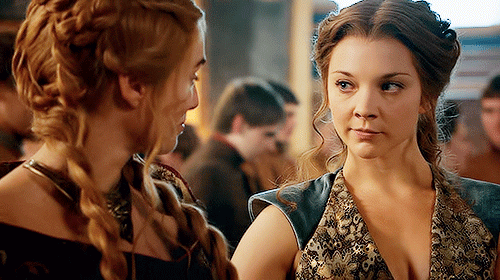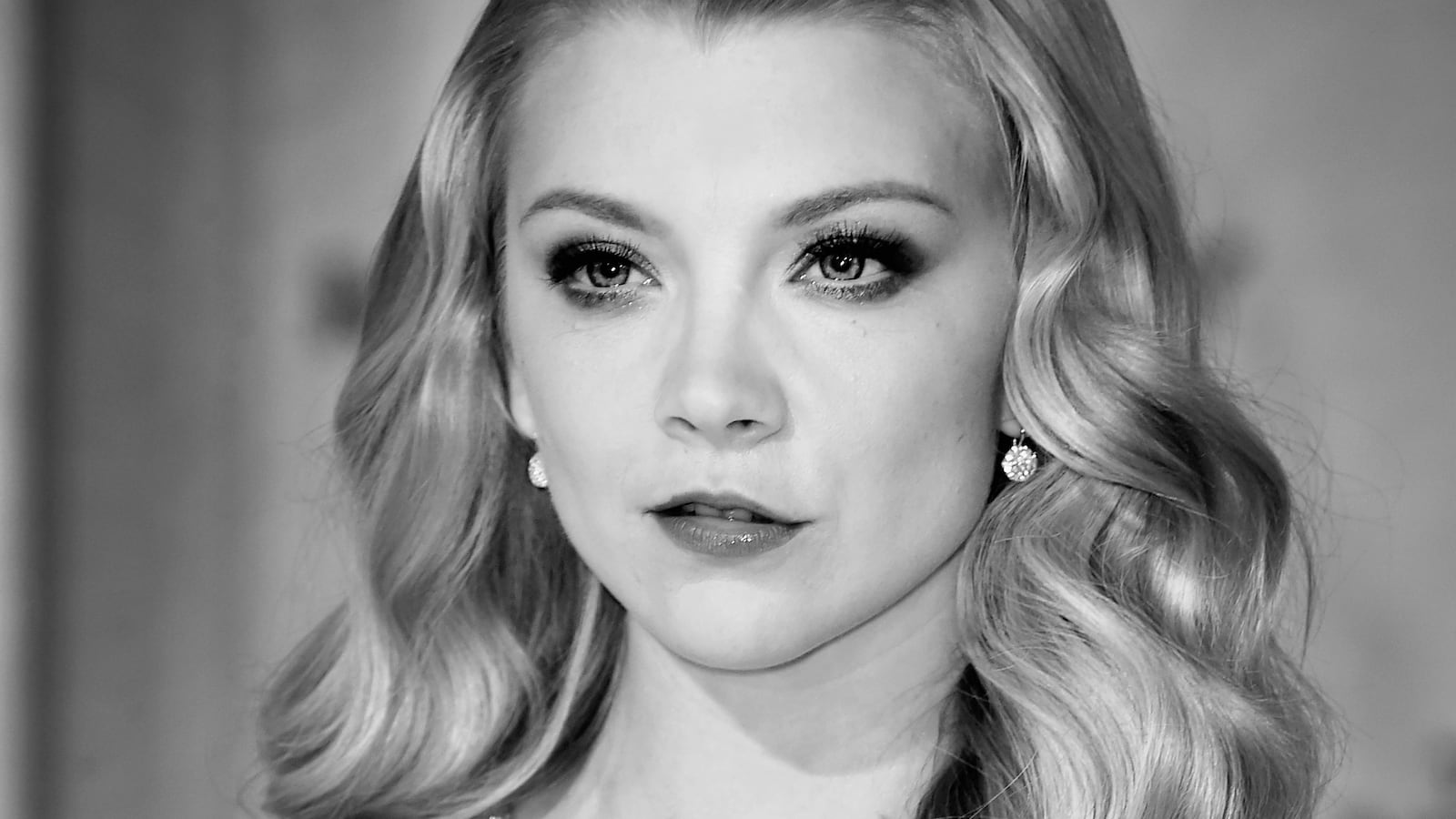“The most terrifying things are the most plausible things,” noted Natalie Dormer, ringing from New York to discuss her turn in The Forest as a woman battling inner and outer demons in Japan’s infamous Suicide Forest. The supernatural horror flick kicks off a genre tear in the Game of Thrones star’s coming year in which she’ll face virus-spawned zombies and whichever mystery foes await her in Westeros come Season 6.
Plausible terrors certainly don’t get much more wrenching or personal than the human horrors at the core of The Forest. Its fictional plot is inspired by the Aokigahara Forest, the macabre Japanese destination where—yes, in real life—as many as 100 people are said to commit suicide every year.
Dormer pulls double duty in the film as Sara, an American who jets to Japan when her twin sister Jess (also Dormer) goes missing abroad. One’s the functioning sibling who’s got her life together; the other an angsty mess, still reeling from a childhood trauma they share. When Jess is last seen entering Aokigahara’s mythic “Sea of Trees,” everyone assumes she’s taken her own life like so many others before her.
Only Sara believes, deep down inside, that her sister is still alive. She packs a bag, links up with Taylor Kinney’s dangerously hunky travel writer, and heads deep into suicide central to save her sis.
“It’s the idea that we all have someone in our lives who, if we got the phone call, we would travel halfway around the world in order to save from pain or danger,” Dormer explained. “Then again, we all have baggage and we all have demons, some more than others.”
She praised the “psychologically interesting and terrifying” script, which was directed by ad exec-turned-director Jason Zada in his feature debut and produced by Batman Begins’s David S. Goyer.
But a considerable roadblock to even horror diehards’ enjoyment of The Forest may be its subject matter and setting. Zada invited scrutiny when he described the Aokigahara Forest—a real place where real people go to die in a country that suffers from a staggering suicide rate—in romantic terms (“It’s been called the most beautiful place to die”) and as the “bad guy” of the movie. Meanwhile, a heated boycott slamming the film for “whitewashing” its Asian locale with a white protagonist went viral last month just as the film’s marketing campaign began.
For her part, Dormer says she didn’t speak with any actual Japanese about the dark pull of the Aokigahara Forest or its tragic history. The film only shot in Japan for a week, flying instead to Serbia to stand in for the famed forest. “I have no idea, to be honest,” she said. “I didn’t talk to any of the locals and ask them that. I can only talk from my place of where I’m working from, as a character.
“Yes, there are dark themes and some very disturbing themes in this movie,” she said. “But I took it from the positive: Sara’s motivation is love. Love for her sister. I can only comment on the idea of putting myself in a position where I’m imagining playing a role, playing a person who loves her sister so much and knows that she’s in pain—and knows that she wants to hurt herself, but wants to be there to save her and has spent her life doing so. I can’t really comment on the phenomenon of the forest any more than Sara could. It’s a personal journey, you know?”
It will come as no surprise if any of a handful of moments in The Forest hit raw nerves in audience members who’ve been close to depression, self-harm, or suicide. How mindful is Dormer of those unprepared viewers who may go into The Forest and leave the theater reeling from the lack of a trigger warning?
“I have to disagree with you! I don’t think this film is about suicide,” she replied. “It’s the setting. Of course, it’s about people being unhappy. It’s a metaphor about trauma and how people process stuff.”
She paused. “I don’t really want to get into a conversation about suicide as a phenomenon, because I’m not really qualified to do so. That’s not my job in this film.”
Dormer was even more careful to watch what she let slip about the upcoming sixth season of HBO’s Game of Thrones, which debuts on April 24.
She shot at least part of her season on location in Girona, Spain, leading fans to speculate that Margaery somehow escapes after Cersei’s scheming landed her behind bars last season.

“What I can say is that the thing I love about Game of Thrones is that every year it makes these unlikely pairings,” she teased. “The beauty of the writing is that it puts together characters that you haven’t seen together and they go on these great tangent mini-journeys together. You have these great couplings like Jaime Lannister and Brienne or, say, Sansa and Littlefinger.
“The thing I’m excited about in Season 6 is that I have a whole new scene co-star that I spend most of my scenes with, who I really, really enjoyed working with,” she added. “That’s what I’m excited for audiences to see.”
Coming off of a big 2015 filled with Margaery Tyrell craziness and her role as a resistance fighter in the blockbuster Hunger Games finale, The Forest also marks a major milestone for Dormer: her first lead role. She also stars later this year in Patient Zero, battling a zombie outbreak with Doctor Who’s Matt Smith and Stanley Tucci.
“I will always go where the good scripts are,” she said. “I work in all mediums, I work on stage, I work in television, in film. I’m not a snob when it comes to the medium I want to do. And I’m not a snob when it comes to the genre. I’m just a snob in the quality of the script. I want to go where there are three-dimensional, real characters. My business is in characterization, in trying to create characters that feel real.”
After she landed her big break a decade ago in Casanova, she told The Daily Beast in 2014 that bad management led to a dry spell that kept her out of the acting game for nearly a year. She climbed her way back through British TV and into Hollywood building a resume with roles in projects like The Tudors, playing Anne Boleyn, for which she earned two Gemini Award nominations. And she began thinking of how she might create her own opportunities. In Darkness, a revenge thriller Dormer co-wrote and is slated to star in as a blind musician who overhears a murder, became one such project.
“Me writing In Darkness was part of being master of my own destiny,” she declared. “I’m the kind of person that tries to be proactive. I want to be positive about a situation. My wonderful partner [and co-writer] Anthony Byrne, was like, ‘Come on, stop waiting for the role to be given to you. Let’s see what we can come up with.’ We started writing that six years ago, before I was given the gifts of Game of Thrones and The Hunger Games. So it goes to show how much has changed in my career in six years.”

Like many of her peers in Hollywood who have publicly addressed the gender disparity between men and women, their salaries, and the opportunities they’re granted in nearly every corner of the entertainment industry, Dormer champions the cause. She’s also, however, unafraid to be optimistic in her assessment of how much progress has been made toward gender parity.
“I think the tide is turning. I think that finally the money men are understanding that 50 percent of the population is female, and it’s only right that we have more three-dimensional, fleshed out, contradictory female characters,” she said. “Television like Game of Thrones, which I’m very proud to be a part of, has led the way in giving cinema a good lesson, which is that it needs to catch up in the equality stakes.”
But progress takes time, she cautioned. “The first talking movie was in 1927, you know? In 1927 not every single woman in my country, in Britain, had the vote,” she said. “You have to look at these things in context. If we haven’t even had the vote in a hundred years, let’s just slow down about being negative about cinema. Let’s see that it’s an evolution and that it’s coming. People have got the message. It’s coming. So let’s lean on the positive.”
The $2.9 billion-grossing Hunger Games films in which Dormer co-starred sent the message loud and clear to studio execs in cold, hard ticket sales numbers: Women can successfully lead lucrative franchises. So why not let them do it more often?
“Katniss Everdeen, one of the highest-grossing movie franchises of the last hundred years, proves that female heroines can be commercially viable for massive blockbusters,” Dormer exclaimed.
But equality, she argued, also needs to be fought for beyond the gates of Hollywood studios.
“Yes, there needs to be more female directors making movies. And yes, there needs to be more female writers,” she said. “But there needs to be more female CEOs. There needs to be more female brain surgeons. This isn’t just an industry issue. This is a world issue.”





